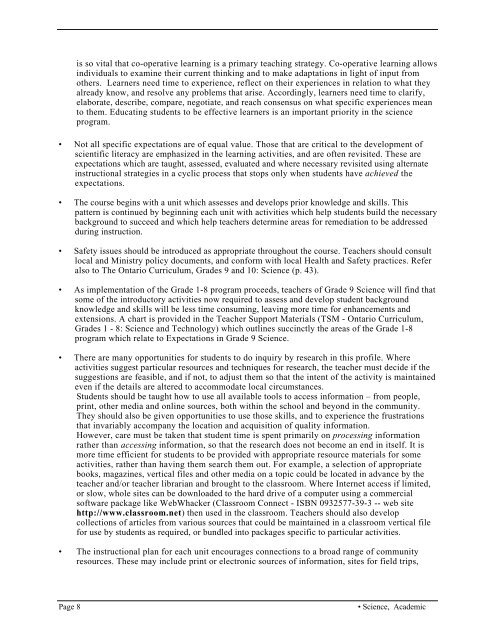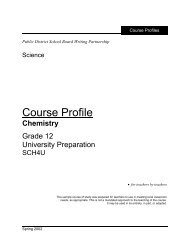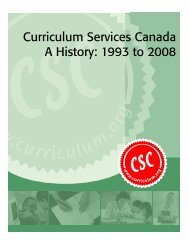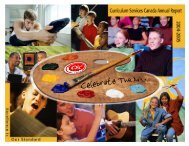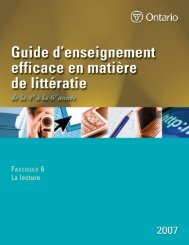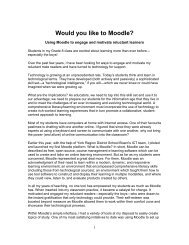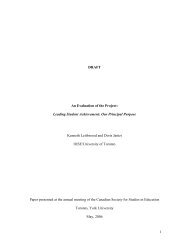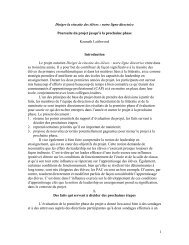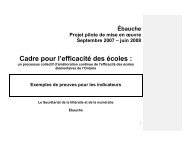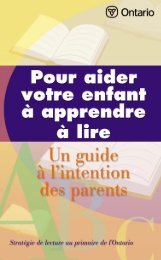Course Profile - Curriculum Services Canada
Course Profile - Curriculum Services Canada
Course Profile - Curriculum Services Canada
Create successful ePaper yourself
Turn your PDF publications into a flip-book with our unique Google optimized e-Paper software.
is so vital that co-operative learning is a primary teaching strategy. Co-operative learning allows<br />
individuals to examine their current thinking and to make adaptations in light of input from<br />
others. Learners need time to experience, reflect on their experiences in relation to what they<br />
already know, and resolve any problems that arise. Accordingly, learners need time to clarify,<br />
elaborate, describe, compare, negotiate, and reach consensus on what specific experiences mean<br />
to them. Educating students to be effective learners is an important priority in the science<br />
program.<br />
• Not all specific expectations are of equal value. Those that are critical to the development of<br />
scientific literacy are emphasized in the learning activities, and are often revisited. These are<br />
expectations which are taught, assessed, evaluated and where necessary revisited using alternate<br />
instructional strategies in a cyclic process that stops only when students have achieved the<br />
expectations.<br />
• The course begins with a unit which assesses and develops prior knowledge and skills. This<br />
pattern is continued by beginning each unit with activities which help students build the necessary<br />
background to succeed and which help teachers determine areas for remediation to be addressed<br />
during instruction.<br />
• Safety issues should be introduced as appropriate throughout the course. Teachers should consult<br />
local and Ministry policy documents, and conform with local Health and Safety practices. Refer<br />
also to The Ontario <strong>Curriculum</strong>, Grades 9 and 10: Science (p. 43).<br />
• As implementation of the Grade 1-8 program proceeds, teachers of Grade 9 Science will find that<br />
some of the introductory activities now required to assess and develop student background<br />
knowledge and skills will be less time consuming, leaving more time for enhancements and<br />
extensions. A chart is provided in the Teacher Support Materials (TSM - Ontario <strong>Curriculum</strong>,<br />
Grades 1 - 8: Science and Technology) which outlines succinctly the areas of the Grade 1-8<br />
program which relate to Expectations in Grade 9 Science.<br />
• There are many opportunities for students to do inquiry by research in this profile. Where<br />
activities suggest particular resources and techniques for research, the teacher must decide if the<br />
suggestions are feasible, and if not, to adjust them so that the intent of the activity is maintained<br />
even if the details are altered to accommodate local circumstances.<br />
Students should be taught how to use all available tools to access information – from people,<br />
print, other media and online sources, both within the school and beyond in the community.<br />
They should also be given opportunities to use those skills, and to experience the frustrations<br />
that invariably accompany the location and acquisition of quality information.<br />
However, care must be taken that student time is spent primarily on processing information<br />
rather than accessing information, so that the research does not become an end in itself. It is<br />
more time efficient for students to be provided with appropriate resource materials for some<br />
activities, rather than having them search them out. For example, a selection of appropriate<br />
books, magazines, vertical files and other media on a topic could be located in advance by the<br />
teacher and/or teacher librarian and brought to the classroom. Where Internet access if limited,<br />
or slow, whole sites can be downloaded to the hard drive of a computer using a commercial<br />
software package like WebWhacker (Classroom Connect - ISBN 0932577-39-3 -- web site<br />
http://www.classroom.net) then used in the classroom. Teachers should also develop<br />
collections of articles from various sources that could be maintained in a classroom vertical file<br />
for use by students as required, or bundled into packages specific to particular activities.<br />
• The instructional plan for each unit encourages connections to a broad range of community<br />
resources. These may include print or electronic sources of information, sites for field trips,<br />
Page 8<br />
• Science, Academic


